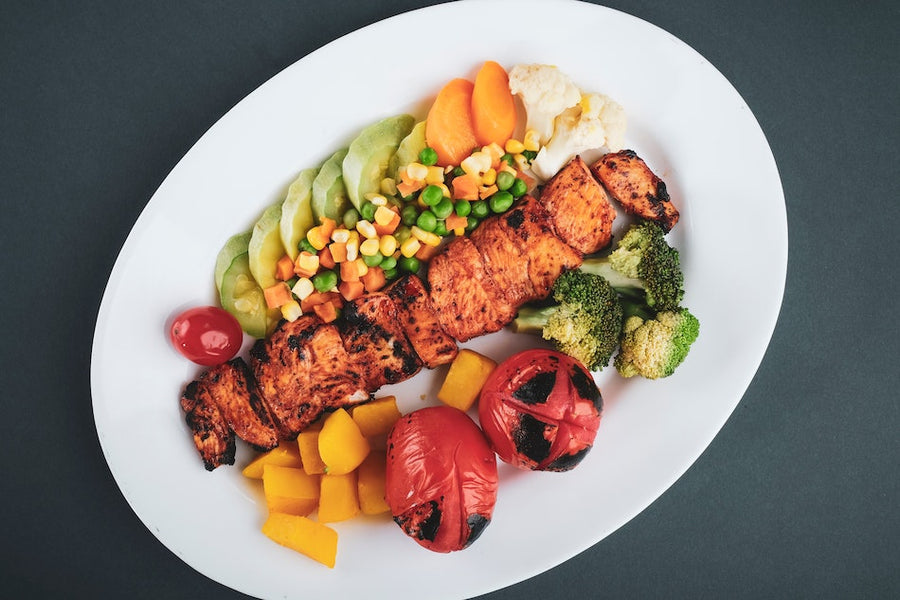Autoimmune diseases like Crohn’s, lupus, and rheumatoid arthritis are becoming more common. While there’s no single cure, the Paleo diet may help manage symptoms and keep these diseases under control. Here’s a straightforward guide on how the Paleo diet can benefit those with autoimmune disorders.
What is the Paleo Diet?

The Paleo diet, also known as the Caveman diet, focuses on eating like our ancient ancestors. This means choosing foods that could be hunted or gathered:
Allowed Foods:
- Lean meats
- Fish
- Fruits
- Vegetables
- Nuts
- Seeds
Avoided Foods:
- Dairy products
- Grains
- Legumes
- Processed foods
- Refined sugars
Benefits of the Paleo Diet
Short-Term:
- Helps with weight loss
- Controls cholesterol
- Reduces heart disease risk
- Improves blood sugar levels
- Lowers inflammation
Long-Term:
- Better blood sugar control
- Reduced inflammation
- Improved cholesterol levels
- Enhanced heart health
- Lower cancer risk
Paleo Diet and Autoimmune Diseases
The Paleo diet may be helpful for autoimmune diseases by reducing inflammation and improving gut health. It has been shown to:
- Lower inflammatory markers
- Increase beneficial gut bacteria
Pros:
- Reduces inflammation
- Improves gut health
- Increases nutrient intake
Cons:
- Eliminates some nutritious foods
- May cause nutrient deficiencies for some people
How to Follow the Paleo Diet
Guidelines:
- Eat plenty of protein (meat, seafood, eggs)
- Avoid processed foods and sugar
- Include a lot of vegetables
- Drink plenty of water
Recommended Foods:
- Fresh vegetables and fruits
- Lean proteins (chicken, fish)
- Healthy fats (olive oil, avocados)
- Bone broth (for gut health)
Sample Paleo Meals:
Breakfast:
- Sweet Potato and Bacon Hash
- Egg Muffins
- Banana Pancakes (made with almond flour)
Lunch:
- Chicken Salad with grapes, celery, and olive oil dressing
Alternatives and Considerations
If the Paleo diet doesn’t work for you, other dietary changes might help. These include avoiding gluten, dairy, nightshade vegetables, and inflammatory foods, and eating more omega-3 fatty acids and probiotics.
Key Studies
- A Paleo diet can help reduce body weight, waist size, and blood pressure.
- It may improve glucose tolerance and reduce cardiovascular risk over time.
- It might lower inflammation and improve symptoms in autoimmune conditions.
- It can improve gut health and reduce inflammation in people with type 2 diabetes.
Conclusion
The Paleo diet may be beneficial for managing autoimmune diseases by reducing inflammation and improving gut health. However, it’s important to consult with a doctor before starting any new diet. A healthcare provider can help create a personalized plan that meets your nutritional needs.
FAQs
Can the Paleo diet cure autoimmune diseases?
- No, but it may help manage and reduce symptoms.
Is the Paleo diet safe for everyone?
- It may not be suitable for everyone, especially those with nutrient deficiencies. Consult a healthcare provider before starting.
What foods should be avoided on the Paleo diet?
- Processed foods, grains, dairy, legumes, refined sugars, and certain oils.
Can I follow a modified Paleo diet?
- Yes, some people may benefit from a modified version that includes certain non-Paleo foods. Consult with a healthcare provider to ensure nutritional needs are met.
What are common misconceptions about the Paleo diet?
- It’s not just about eating meat or being low-carb; it’s about eating real, unprocessed food.


